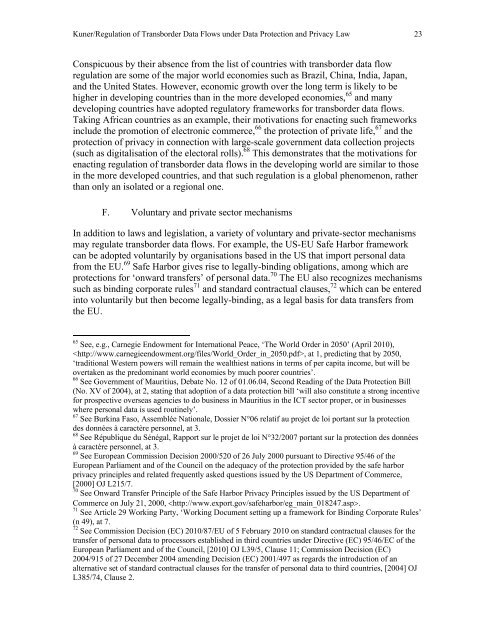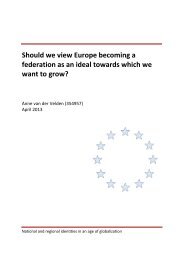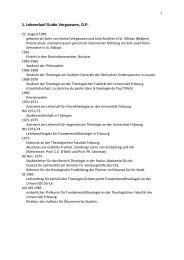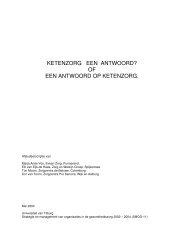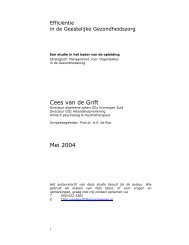Regulation of Transborder Data Flows under ... - Tilburg University
Regulation of Transborder Data Flows under ... - Tilburg University
Regulation of Transborder Data Flows under ... - Tilburg University
You also want an ePaper? Increase the reach of your titles
YUMPU automatically turns print PDFs into web optimized ePapers that Google loves.
Kuner/<strong>Regulation</strong> <strong>of</strong> <strong>Transborder</strong> <strong>Data</strong> <strong>Flows</strong> <strong>under</strong> <strong>Data</strong> Protection and Privacy Law 23<br />
Conspicuous by their absence from the list <strong>of</strong> countries with transborder data flow<br />
regulation are some <strong>of</strong> the major world economies such as Brazil, China, India, Japan,<br />
and the United States. However, economic growth over the long term is likely to be<br />
higher in developing countries than in the more developed economies, 65 and many<br />
developing countries have adopted regulatory frameworks for transborder data flows.<br />
Taking African countries as an example, their motivations for enacting such frameworks<br />
include the promotion <strong>of</strong> electronic commerce, 66 the protection <strong>of</strong> private life, 67 and the<br />
protection <strong>of</strong> privacy in connection with large-scale government data collection projects<br />
(such as digitalisation <strong>of</strong> the electoral rolls). 68 This demonstrates that the motivations for<br />
enacting regulation <strong>of</strong> transborder data flows in the developing world are similar to those<br />
in the more developed countries, and that such regulation is a global phenomenon, rather<br />
than only an isolated or a regional one.<br />
F. Voluntary and private sector mechanisms<br />
In addition to laws and legislation, a variety <strong>of</strong> voluntary and private-sector mechanisms<br />
may regulate transborder data flows. For example, the US-EU Safe Harbor framework<br />
can be adopted voluntarily by organisations based in the US that import personal data<br />
from the EU. 69 Safe Harbor gives rise to legally-binding obligations, among which are<br />
protections for ‘onward transfers’ <strong>of</strong> personal data. 70 The EU also recognizes mechanisms<br />
such as binding corporate rules 71 and standard contractual clauses, 72 which can be entered<br />
into voluntarily but then become legally-binding, as a legal basis for data transfers from<br />
the EU.<br />
65 See, e.g., Carnegie Endowment for International Peace, ‘The World Order in 2050’ (April 2010),<br />
, at 1, predicting that by 2050,<br />
‘traditional Western powers will remain the wealthiest nations in terms <strong>of</strong> per capita income, but will be<br />
overtaken as the predominant world economies by much poorer countries’.<br />
66 See Government <strong>of</strong> Mauritius, Debate No. 12 <strong>of</strong> 01.06.04, Second Reading <strong>of</strong> the <strong>Data</strong> Protection Bill<br />
(No. XV <strong>of</strong> 2004), at 2, stating that adoption <strong>of</strong> a data protection bill ‘will also constitute a strong incentive<br />
for prospective overseas agencies to do business in Mauritius in the ICT sector proper, or in businesses<br />
where personal data is used routinely’.<br />
67 See Burkina Faso, Assemblée Nationale, Dossier N°06 relatif au projet de loi portant sur la protection<br />
des données à caractère personnel, at 3.<br />
68 See République du Sénégal, Rapport sur le projet de loi N°32/2007 portant sur la protection des données<br />
à caractère personnel, at 3.<br />
69 See European Commission Decision 2000/520 <strong>of</strong> 26 July 2000 pursuant to Directive 95/46 <strong>of</strong> the<br />
European Parliament and <strong>of</strong> the Council on the adequacy <strong>of</strong> the protection provided by the safe harbor<br />
privacy principles and related frequently asked questions issued by the US Department <strong>of</strong> Commerce,<br />
[2000] OJ L215/7.<br />
70 See Onward Transfer Principle <strong>of</strong> the Safe Harbor Privacy Principles issued by the US Department <strong>of</strong><br />
Commerce on July 21, 2000, .<br />
71 See Article 29 Working Party, ‘Working Document setting up a framework for Binding Corporate Rules’<br />
(n 49), at 7.<br />
72 See Commission Decision (EC) 2010/87/EU <strong>of</strong> 5 February 2010 on standard contractual clauses for the<br />
transfer <strong>of</strong> personal data to processors established in third countries <strong>under</strong> Directive (EC) 95/46/EC <strong>of</strong> the<br />
European Parliament and <strong>of</strong> the Council, [2010] OJ L39/5, Clause 11; Commission Decision (EC)<br />
2004/915 <strong>of</strong> 27 December 2004 amending Decision (EC) 2001/497 as regards the introduction <strong>of</strong> an<br />
alternative set <strong>of</strong> standard contractual clauses for the transfer <strong>of</strong> personal data to third countries, [2004] OJ<br />
L385/74, Clause 2.


